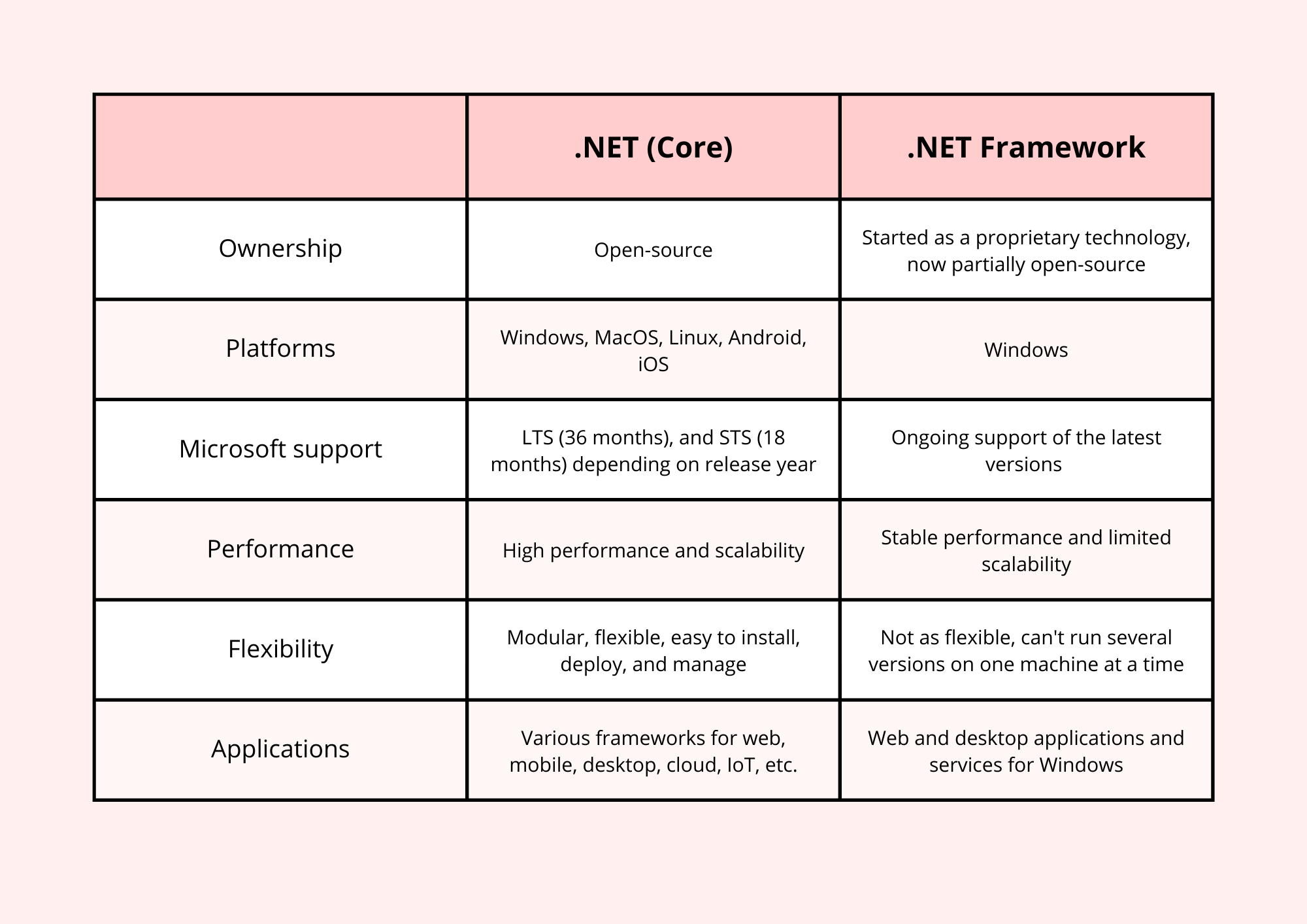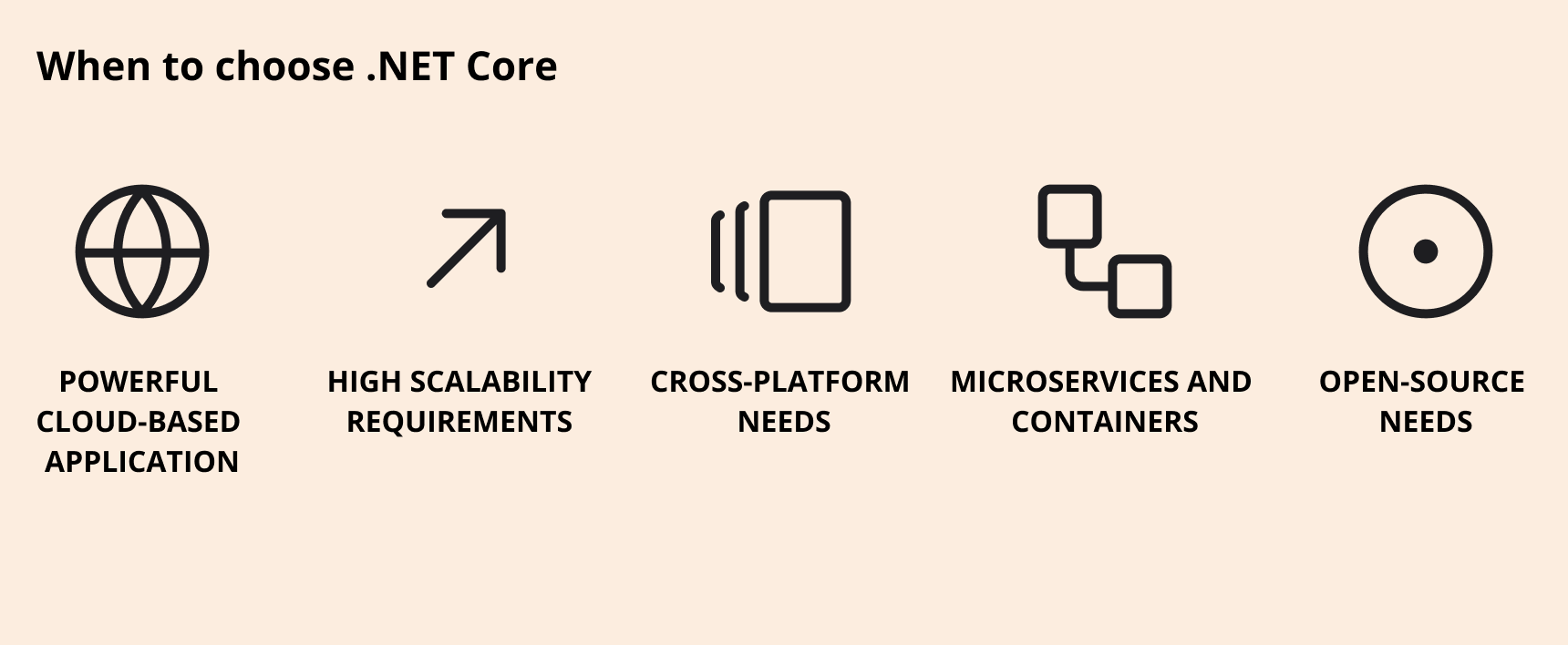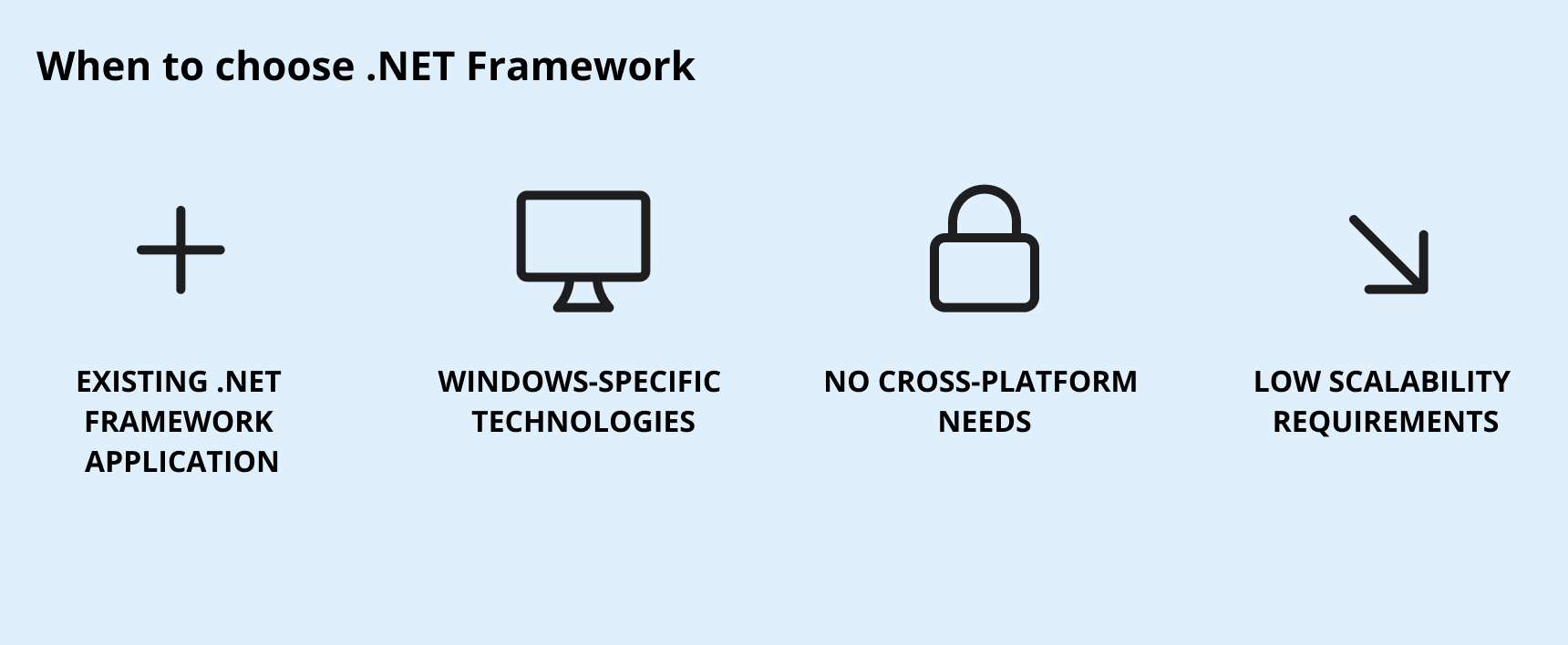.NET Core vs. .NET Framework Differences: What to Choose for Your Project
.NET Core and .NET Framework are two implementations of .NET platform — an all-in-one programming environment that allows you to develop, compile and deploy modern applications of any complexity and scale. Two implementations, one optimal choice. If you are reviewing the differences between .NET Core and .NET Framework trying to decide what to pick for your stack, read on.
In this short guide, you will learn about the specifics of each implementation and get a detailed side-by-side comparison of .NET Core vs. .NET Framework. You will also find expert advice from our senior tech specialist on how these implementations fit various business requirements. So that you could make an informed decision for your software project.
Before we get into a detailed analysis and dissect .NET Framework vs. .NET Core differences, let’s make a quick overview and see where each implementation stands in the .NET environment.
.NET is a resourceful and versatile developer platform created by Microsoft for building apps/applications for web, mobile, desktop, IoT, microservices, cloud, games, and AI. .NET includes various frameworks, libraries, reusable components, programming languages, IDEs and tools for engineers.
.NET Framework is the original implementation of .NET released in 2002 to build and run web and desktop applications on the Windows platform.
.NET Core is a successor of .NET Framework. It was originally released in 2016 to address the growing cross-platform and cloud needs and went through several major updates (e.g., .NET Core 3.1). In 2020, .NET Core was succeeded by a unified .NET 5 platform that Microsoft updates every year — .NET 6 (2021), .NET 7 (2022), .NET 8 (2023), etc. Since then, the term ‘Core’ is no longer used for the newer versions. So when we talk about .NET vs. .NET Core today, what we really mean is different versions of the .NET platform.
Now that you have a high-level idea of what these two implementations stand for, let’s delve into a side-by-side comparison of .NET Framework vs. .NET Core and go through the fundamental differences between the two that will impact your choice.

Comparison table: .NET Core vs .NET Framework
Supported platforms
.NET Framework is hard-wired for Windows applications and Windows-specific technologies. On the contrary, .NET Core was originally designed as a flexible cross-platform alternative to .NET Framework. Starting from the early version and later to .NET 5 and on, it supports different platforms, including Windows, Linux, macOS, Android, and iOS.
Types of applications
Modern .NET platform provides various resources and tools to build any type of application or software, from lightweight mobile apps to games to cloud-based IoT platforms. It is packed with a whole range of frameworks for building powerful applications for web, mobile, and cloud. .NET Framework, originally designed for Windows, is used to build web and desktop apps and services for Windows.
Speed and performance
.NET Framework is a seasoned, time-proven framework that shows consistently high productivity and performance. However, it is no match to .NET Core which was built with high scalability and performance requirements in mind. Moreover, the modern .NET platform receives a massive performance boost with every new release. So when comparing .NET Framework vs. .NET Core performance, the latter takes the lead.
Microsoft support
Technical support and regular upgrades are important to mitigate security vulnerabilities and maintain high performance.
Microsoft continues supporting the latest versions of .NET Framework (4.6.2 and higher) for as long as there’s a huge number of Windows applications that run on these versions.
Modern versions of .NET are supported depending on their lifecycles. In particular, the versions released in even-numbered years (e.g., 2022) get Long Term Support (LTS, 36 months), and odd-numbered releases get Standard Term Support (STS, 18 months). Currently, Microsoft actively supports .NET 6 and .NET 8.
Open source
Another important difference between .NET Framework and .NET Core is ownership. .NET Framework started as a proprietary technology. Today, both .NET Core and .NET Framework have open-source components. However, the true open-source nature of .NET began when Microsoft announced the release of .NET Core in 2014 under .NET Foundation and the open-source community.
Compatibility
When comparing .NET Framework with .NET Core, especially for developing Windows applications or migrating from .NET Framework to .NET, it’s important to take into consideration compatibility with various libraries, APIs, and technologies. Even though .NET Framework and the latest .NET versions share multiple components, there are some .NET Framework technologies not supported by .NET Core.
The answer depends on the unique requirements of your business as well as your current infrastructure and resources. Both .NET Core and .NET Framework are viable solutions. But they fit different goals. Let’s look into a few common scenarios for each choice.
When to choose .NET Core

Build high-performing applications
If you plan to build a brand new application bound for growth and scalability, choose the latest .NET, preferably the releases that get Long Term Support. .NET Core and later .NET versions allow to build high-speed, high-capacity systems, enable effective installation and deployment, and provide savings due to lower infrastructure and hosting costs.
Run on various platforms
Cross-platform support is one of the biggest benefits of .NET Core vs. .NET Framework. So if your goal is to provide your audience with an omnichannel experience or you need to extend your current application to new platforms, opt for .NET Core or later versions of .NET.
Choose microservices and containers
.NET is your best choice if you want to leverage microservices on a new project or reengineer your system and migrate to microservices for better flexibility and scalability. .NET Core supports modularity and allows to create lightweight, independently deployed services.
.NET is also a perfect choice for containers (Docker, Kubernetes) that help you save resources and run, deploy, and scale applications effectively.
Expect scale-up
When you choose between .NET Framework and .NET Core, consider the scalability requirements of your system. For building highly-scalable applications that need to handle the growing load without compromising performance, opt for .NET Core or later versions of .NET. The modularity and flexibility of this framework enable easy and seamless scalability.
Use the power of .NET for your business
Create reliable, secure and effortlessly scalable applications that empower your business and engage your customers.
Show .NET servicesUse open-source technologies
Unlike the original .NET Framework, .NET Core and later versions of .NET are free and fully open-source. Moreover, Microsoft provides an abundance of free tools and editors like Visual Studio Code for effective and productive engineering. So if you prioritize open-source technologies on your project, go for .NET.
When to choose .NET Framework

Extend .NET Framework application
If you already have a stable working .NET Framework application and want to extend its functionality within the Windows platform, stick to .NET Framework. There’s no need to invest in costly migration to .NET just for the sake of replacing the stack. The same applies if your system has a strong dependency on Windows APIs and libraries that haven’t been shipped to .NET Core.
Focus on the Windows environment
.NET Framework is a natural choice for server applications aimed specifically at Windows and hard-wired for Windows technologies. Plenty of SMB and enterprise companies today use and support .NET Framework applications.
Don’t have cross-platform needs
Evaluate your platform requirements early on when choosing between .NET Framework and .NET Core. If you don’t expect to extend your system to new platforms other than Windows in the future, .NET Framework should be enough.
Low scalability requirements
If you are building a rather simple application, and scalability is not your primary concern, .NET Framework could fit your project. But again, that is relevant only if you build for Windows only.
It may seem a lot to process. If you still have questions or need help figuring out what option will work best for your software project, we can help. .NET is our core technology. We have over 50 senior and lead .NET engineers on board and over a decade of .NET experience delivering and supporting successful .NET projects since 2010. Our .NET expertise includes:
- Design, development and ongoing support of a high-load web system and dozens of complex web applications for a leading US photo printing lab, Printique. Over the course of our collaboration since 2010, we have been expanding and supporting Printique’s extensive online services based on .NET technologies and multiple third-party integrations, enabling the company’s superior user experience and tech excellence. This includes the design and development of web applications for photo editing, production monitoring software, gradual migration to modern .NET frameworks and platforms, and transition to microservices. Read the full success story…
- Development and support of a custom lexical data processing framework for Oxford University Press (OUP). Based on the combination of .NET and Python technologies, the Dictionaries Conversion Framework helps OUP cut lexical data processing time and costs by 10x. Our dedicated team has been supporting and upgrading the framework since 2016 continuously improving the speed and quality of lexical data conversion and developing data products that are used worldwide by companies like Apple, Microsoft, Google, and Amazon. Read the full success story…
- .NET backend team augmentation for a Spanish travel tech company Lodgify. Since the beginning of our collaboration in late 2019, we have extended the client’s backend team with 9 senior .NET engineers adding unique tech expertise and helping the client meet their delivery goals without inflating development costs. Read the full success story…
Whether you are looking for an experienced .NET services provider to help you leverage the power of .NET platform for your business, or need to extend your in-house .NET team with skilled engineers, we have your back. We will help you evaluate the benefits of .NET Core vs. .NET Framework and apply them to the unique requirements and goals of your business. Check our .NET development services and contact our team to schedule an intro call with our specialists and talk about your tech needs.
Start your .NET project with a skilled team
Engage top-tier .NET specialists to develop secure, scalable, and high-performing software for your business.
HIRE .NET DEVELOPERSKey takeaways
- Detailed .NET Framework vs. .NET Core comparison shows how these two implementations of the .NET platform differ in ownership, platform requirements, scalability, performance, capabilities, compatibility, and support.
- .NET Core and later versions are an optimal choice for building modern cloud-based applications, whereas .NET Framework is a viable solution for extending and building Windows applications and services.







